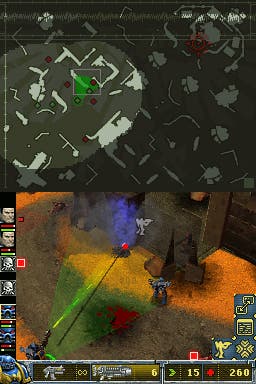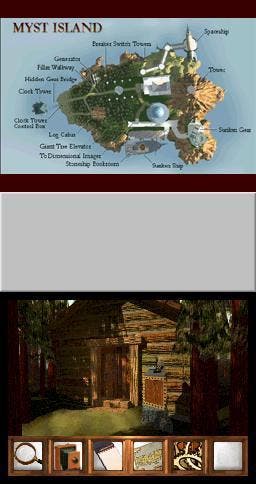DS Roundup
Warhammer Squad Command, Myst, Jenga, Mortal Kombat and Op: Vietnam.
Warhammer 40, 000: Squad Command
- Developer: Red Lynx
- Publisher: THQ
I'm partial to a game with a title that also acts as the instruction manual. Squad Command: command squad. Simple. Life would be a lot easier with titles like Tomb Raider (raid tomb), and Dungeon Master (master, er, dungeon). Though surely none can match the inspired retro classic Stop The Express for sheer purity of intent. None of your Deus Ex rubbish here. Far too complicated.
The squad (which you command) in this self-explanatory Warhammer 40K spin-off is comprised of various Imperium units: Scouts, Space Marines, Dreadnoughts and others. Six pre-selected units take part in turn-based combat sans any form of resource gathering. No iron or gold to mine; it's just kill or be killed. Behind all this is a bare-bones story that pits you against the Word Bearers, soldiers on the side of Chaos. If you find all that meaningless, ignore it. Only know that each unit has a number of points to move and shoot, and a selection of primary and secondary weapons that make a suitable mess of the scenery when fired.
Nearly all of the criticisms addressed in the recent PSP review apply here (which certainly makes my job a lot easier. Cheers, Alec). It goes without saying, though, that the visuals on the DS are slightly downgraded and the cut-scenes cut down completely. Conversely, the added functionality of the touch-screen provides something the PSP never had. The stylus is used to select and order units, yet the small squads and sedate nature of combat don't necessarily make this feature essential. Often it's easier to use the d-pad and face buttons in order to avoid accidentally tapping to move when you should be shooting, especially as you can't undo commands.

In addition, it's often hard to direct your characters exactly where you want them to go. When you manoeuvre your cursor to the place you want your little chap to end up, there may not be enough space from the nearest piece of scenery to accommodate him, even though the game tells you it should be fine. While there's usually enough leeway to scrape by, it can sometimes leave you exposed to disaster if you're on your last legs.
The second screen offers a handy albeit non-interactive map of the overall area, allowing you to view nearby enemy positions. During an enemy's turn, it's the best way to see their movements, but if you're not in the right place, you'll miss any attacks against your men. The only indication at that point is the sound of gunfire and a splash of red on their portrait. While it doesn't ruin the game, it would certainly have been nice to switch over instantly see what was going on while you wait.
Just like the PSP version, the inability to choose which characters to take into battle in single-player rather limits the potential of its fifteen missions. The similar-looking maps and fluctuations in the CPU's intelligence don't do for continued exposure, either. This is a game that could have benefited from a level editor or random map generator at least. What redeems it are bite-size, non-complex chunks of WH40K action. There's a new weapon or unit to try out each level and maps are full of enough cover to try various approaches. It's competent enough to invest a week in, including a few rounds of multiplayer. Yet its lack of modes, characters and ultimate depth means it won't sustain for long.
7/10
Myst
- Developer: Cyan Worlds
- Publisher: Midway
Quick tip: if you want to be a successful critic in this blaggard world of videogames, you have to hate Myst. An exaggerated expression of revulsion in the presence of its name will get you far. It was a prominent baby boomer of the burgeoning CD-ROM revolution (Myst sold bucketloads), but arguably side-tracked the adventure game genre down an awful path that resulted in its current faded glory. For shame.
So-called Myst clones still survive to this day: beautiful, surreal landscapes clicked through picture by picture with no real explanation of where to go or what to do. Their means of progress are solving elementary puzzles with little in the way of obvious clues, usually involving matching symbols or pulling levers until something interesting happens.

Much to my own chagrin, I thought, perhaps, I was being too hard on Myst. Hadn't peer pressure led me to hating it? After all, I seem to recall being thrilled by it in the hours spent playing in the school library when I should have been studying. I was prepared to give this DS version a chance. If only nostalgia wasn't such a deceitful fellow.
Evidently my younger self was more eager to play Wolfenstein 3D than solve obscure logic puzzles. I'd never have given it another chance if, back then, I'd got so far as the part of Myst in which you end up trapped in an underground railway maze of identical tracks, only able to reach the exit by painstakingly mapping out the entire area. Mapping? That archaic, awful necessity in this day and age? Or even in that day and age? For shame.
You would think the DS conversion would have that covered. Sadly, no - its efforts to match the powers of the platform it's on are minimal, going for a like-for-like conversion of the puzzles instead. The mouse - sorry, stylus - is used to click through locations frame by frame, and to activate switches with a single tap or press. There's no scratching, talking, or anything special that couldn't be done a decade ago. A screen can be brought up to take notes, but this is text only, painstakingly tapped out on an on-screen typewriter. To not have the ability to freely scribble thoughts, diagrams, or even maps yourself is just plain silly. What could also have been another handy feature - the ability to snap photos of your current location - is let down by an apparent bug that only photographs the first page of any book you're holding instead of the page you actually want.
Glitches are prevalent in this conversion. Whether through sloppy programming or the inability to stuff the game onto DS, I wouldn't know. Suffice to say, as well as various parts of the screen appearing where they don't belong on occasion, the resolution is far too grainy for what should be a graphical showpiece. A magnifying glass used to zoom in for a closer look at scenes simply causes a useless pixellated blur to appear on the top screen instead. I'm sorry to say the DS can't handle this properly.
Even the staunchest of Myst fans can't deny that this is a pretty poor port. Despite being faithful to the original in sound effects and atmosphere, its glitches and lack of new, DS-specific functions ultimately inhibit its worth. That said, while Myst may be an inherently awful game, I've always thought it to be one of those games it's essential to experience first-hand for an education in the evolution of gaming. Its influence is still felt today, for better or worse. Don't bother with this version, though (or even the better-looking PSP one) - you can play the fully-3D update, RealMyst, absolutely free on GameTap.
3/10
